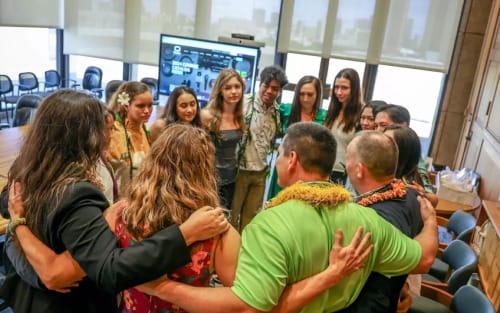Youths Win Landmark Settlement in Hawai'i That Enshrines “Life-Sustaining Climate Policy” Into Law

The outcome of the case marks a major victory for young climate activists.
Story originally published by Sierra
Parties to the first-ever constitutional climate lawsuit focused on addressing climate pollution from transportation announced a historic settlement agreement on Thursday in Hawai'i. The court-approved agreement puts the Aloha State’s fossil-fuel-dependent transportation system on the path to transformative change in line with state climate objectives and recognizes the right to life-sustaining climate under Hawai'i’s constitution.
“You have a constitutional right to fight for life-sustaining climate policy,” Hawai'i governor Josh Green said at a press conference, addressing young climate activists who sued the State of Hawai'i and the Hawai'i Department of Transportation (HDOT) two years ago. Green praised and thanked these youth leaders and called the amicable resolution of the lawsuit “groundbreaking.”
The resolution of Navahine F. v. Hawai'i Department of Transportation marks the first settlement of its kind in a climate accountability case, in which state government officials have committed to working with young people to protect their constitutional rights and address the climate crisis. “Climate change is indisputable. Burying our heads in the sand and making it the next generation’s problem is not pono,” HDOT director Ed Sniffen said in a statement, referring to the Hawaiian word for righteousness.
On June 1, 2022, 13 youths, supported by Our Children’s Trust and Earthjustice, sued HDOT and its director, as well as the state and governor, arguing that the transport sector’s high levels of climate pollution contribute to dangerous climate change in violation of rights protected under Hawai'i’s constitution. The lawsuit aimed to hold Hawai'i’s transportation department accountable for achieving the state’s statutory target of reaching net-negative carbon emissions economywide by 2045. The transportation sector is the largest source of greenhouse gas emissions in Hawai'i, and state data indicated these emissions were projected to rise by 41 percent by 2030.
Under the settlement agreement, HDOT has committed to a number of measures to implement and accelerate decarbonization of the state’s petroleum-reliant transportation system. A comprehensive greenhouse gas reduction plan, to be developed within the next year, will serve as a road map to guide these efforts and will include interim emissions reduction targets aligned with the 2045 goal, with reviews to update on progress every five years. The department will prioritize reduction of greenhouse gas emissions and vehicle miles traveled in its planning and projects, and will accelerate efforts to expand the statewide public electric vehicle charging network while improving pedestrian, bicycle, and public transit infrastructure and options. HDOT and other parties to the settlement will partner to develop programs to enhance public education and engagement on clean transportation, and the state will establish a volunteer youth council to help advise the department as it implements its climate commitments.
“Hawai'i is rising to the challenge of decarbonizing its transportation system,” Ciara W.K. Kahahane, deputy attorney general, said at the press conference.
When implemented, the settlement “will make Hawai'i a leader in reducing transportation emissions, the largest single source of greenhouse gas emissions here and across the continental United States,” Leināʻala L. Ley, a senior associate attorney for Earthjustice’s Mid-Pacific Office, said. “This agreement gives Hawai'i a boost in our race against climate disaster and offers a model of best practices that other jurisdictions can also implement.”
Andrea Rodgers, deputy director for US Strategy at Our Children’s Trust, agreed that the historic action provides “a model for states and countries around the world to start tackling transportation emissions.” “What we see today is democracy in action, with the coming together of all three branches of government, led by our youth who activated their courts when their rights were in danger,” Rodgers added. “For the first time, all three branches of government are committing to work together to do what they must do according to best available science to protect young people’s constitutional rights to a life-sustaining climate.”
The announcement of the settlement comes just days before the case had been scheduled to begin trial on June 24. The trial will no longer proceed. It also marks the second significant victory in a youth-led constitutional climate lawsuit in the US, following last year’s historic triumph for young people in their case against Montana’s state government. That case, Held v. State of Montana, went to trial last June in what was the first climate trial of its kind in the country.
Several of the Hawai'i youth plaintiffs, speaking at Thursday’s press conference, remarked on the importance of youth activism and standing up for what’s right amid the worsening climate emergency.
“Courage is what got us here,” said plaintiff Pahonu C.
“Today is a victory for us, the state, and every young person who believes in the power of their voice,” 16-year-old plaintiff Rylee Brooke K. said. “Today is a testament to what can be achieved when we stand together with purpose and conviction to hold our governments to their promises for our planet.”


